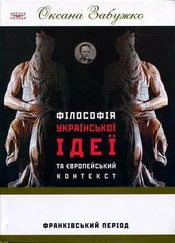I’ll kneel where I stand: oh, there’s been
A ter-rible, transgressive sin—
To this day I quake, vomit thrusts at my throat,
Grinding hummocks of frozen ice
In my gut! In my chest!
Whom can I beg: blow it out,
This dry blue blaze
Lift this weight off my chest?
Because, I am guilty after all, because my love stayed behind in Cambridge, it melted in the spring together with the deep snows, and by the summer, by the time of your arrival, only the scar remained—and hope, hope that you could bring it back to life. I should have figured this out sooner: bringing things back to life is not your métier.
An unexpected call from home—from a girlfriend who went into business about a year ago and the only one of all my Kyiv friends and acquaintances who can afford to call the States: “Are you sitting down, are you able to handle some really terrible news?” she asks. “Like what?” There is a short pause in the receiver and then a choked voice: “Darka’s dead.” One second and my legs feel like they’ve just been blasted with hot ash and go numb, and right after that my whole body loses feeling, like anesthesia: No! (But somewhere in the back of my mind buzzes a nasty thought, like an escaped insect on a windowpane: lucky dog, her suffering’s over—because she did suffer really a lot, beautiful, smart, she looked so good in those colorful peasant kerchiefs she would tie back, with tassels over the shoulders of her sheepskin coat—rosy cheeks, high cheekbones, like a dark-red winter apple, a sharp, mouse-like nose, heart-shaped lips, a genuine artifact of folklore, a living illustration to Gogol’s “Christmas Eve,” and she had a great sense of humor, also Gogolian, classic Ukrainian: the type where you’re spinning your tale deadly serious and the audience is on the floor laughing—and yet her whole youth was one of suffering—with her stupid mother who screwed up both her husband and her kids, with her asshole men: her first husband left her as soon as he graduated, as soon as he was assigned to a job in the capital, which was the reason, it turned out, that he married her in the first place; her second marriage ended in a terminated pregnancy and after that there was no end to gynecological problems, straight downhill; and with her third man, mushy as Wonder Bread and always unemployed, she had to work for two while he looked after the kid, at least he did that much—she tutored all the private students she could get, accepted translations, hopped around from one rental unit to another the way we all did, pulling her family behind her on her back, completed her dissertation, and wonder of wonders finally got a job in some newly established Ukrainian-American foundation, got on her feet about three months ago, they were driving back from Boryspil airport—a stone-drunk Lada toward them in their lane, head-on collision: four people, everybody in the car, dead on the spot, good-bye Charlie, and only a high, thin clear voice laments—tearlessly!—like a soundtrack to a film: “oh had I known I’d be dying, I’d have asked you to cut down the sycamore, to build a casket of four sides strong, so it would stand there thirty-four years long, it stood there, it stood there, and began to rot, and the casket turned to the girl and began to talk: either burn me up, or chop me up, either chop me up—or give the body up…”) Standing in the middle of the kitchen with the receiver in my hand, holding on to Sana’s voice asking for the tenth time what will happen to Talia now, what will happen—Talia’s only five, high cheekbones, looks a lot like her mother, nice-looking except for her father’s potato nose, one time when she was still an infant she had struck you with her lost, wavering, questioning, watery look in her eye, which seemed to be searching for something to fix itself to—Darka was changing her diaper, and suddenly this poem appeared, whispered by an invisible wind:
How strange it is—a girl, a child.
An expression of dissatisfaction on her face:
First straighten out this life,
Then call me in.
You little doll, you tiny person, forgive—
A world who-knows-when painted last,
Your parents, who threw you in here
As though to your death on a barren field
—Okay, start growing!
—standing this way she distinctly hears that other , soundtrack voice—not Darka’s, although Darka was a good singer and Ukrainian folk-songs she did particularly well, who knows where she got that natural, chesty, folk intonation—a deep, precipitous wellspring—you can’t fake that if you don’t have it, even the most drunken crowd would melt, curling back in their chairs like tripe, just as soon as Darka took a deep puff of her cigarette—tilting her brow: “nicotine-vitamine”—and began to sing in that incredibly clear voice, her face would clear up with a gentle sadness, flower petals fell to the ground, horses stood quietly, ears perked, boats swayed from side to side in the waves at the shore, splish-splash, splish-splash, splish-splash, grass rustled under someone’s stealthy steps, and the water carried away willow leaves; and everything else, all over the world, was carried away by water, some kind of nameless people populated this world, they yearned for something, they loved and they suffered, and only the scattered wet traces of voices (wails?) were left in their wake—you can only drink from those tiny tracks, you can only feel: that your own suffering, illuminated for an instant by a late, setting ray of meaning—is not the only one out there, not the first nor the last, and suddenly she remembers that in the song with the casket it actually stood empty for twenty -four rather than thirty -four years: that woman, who sang about her death in such high and piercing tones (I’d lay down my husband, but I love him so, I’d lay down myself, but my child is small: lie down, my dear wife, your child will be fine, people will help out…) was in fact a lot younger than us, still a kid—and you (that’s Sana railing at me now), have you gone mad out there, you idiot, making a huge tragedy out of a bad fuck—well, if you put it that way, then it’s not really a tragedy, everything depends on how you tell the story, except that Sana doesn’t know, and nobody knows what Darka told you shortly before you left—that was perhaps the first time she really opened up to you even though you’d known each other since college, a year earlier Darka’s father had died—he was an award-winning musician, a deputy, and in his day practically a member of the Communist Party Central Committee, although, it’s true, even he got into a little trouble for “nationalism,” so he started playing at state concerts, while his wife, who had gotten used to a comfortable life, would nag him to death if ever he tried to give a toast at official banquets in Ukrainian—even if uttered thickly and stupidly, playing the jester with his “howdy-doody” wordplays, the Central Committee official representative—a concrete slab in a gray suit—sat disapprovingly silent: not a single muscle moved on his impenetrable, seemingly waterlogged, face, ai-ai-yai, we’re in trouble now, “and you were gonna go on that trip to Canada,” the wife yelped, taking off her coat in the hall while a pregnant Darka, dying from the toxicity, was grinding up some coffee in the kitchen for her father—“you use that head of yours for thinking, ever?”—and her old man, after walking into the kitchen and lighting up a cigarette (first breaking a few matches), told his daughter roughly (also, like his wife, in Russian): “I know, I’m merely a sociopolitical buffoon,” and this phrase stayed with her always, a hammered-in nail—she buried him at the exclusive Baikove cemetery, obituaries in all the papers, and the orchestra played, according to the wishes of the deceased, the Cossack farewell—“the stallion bowed his head,” the late child, Darka was a late child, by the time she was born her father was forty, a good-looking, mature man at the height of his fame, how else could you hang on to him if not with another child?—“I’ve just now, myself a woman, understood my mother,” Darka told you with pain in her eyes, “I just got it—I’m the one who shows up at the end of the banquet and pays the bill”—that night she didn’t sing and the two of you huddled at the end of the table and you listened, chilled to the marrow by the blast of brutal courage with which she confronted life, and equally by the bone-piercing draft of at-once established sisterhood: we pay, girls, we do, we pay for everything, down to the last penny!—then we were flagging down a cab, cramming inside like sardines, crackling the thick cellophane of our flower bouquets: it was somebody’s birthday, maybe even Sana’s—someone was trying to squeeze in between the seats, somebody in an awkward fur coat was squeezing onto someone’s lap, giddy-up!—as the first Soviet cosmonaut apparently said—and—you were off, in flight, two sisters, two doves: you across the ocean, and Darka—further still, a milk-white shadow setting out from a pile of crushed metal and on to one of the most distant stars—late child, brought into the world by a mother who wanted to hang on to her husband, and once there was no one to hang on to—life was exhausted, God opened his right hand and released the aching soul: peace be with you, tormented one, go and rest.
Читать дальше
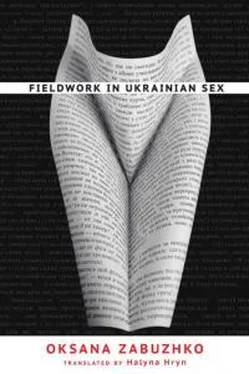
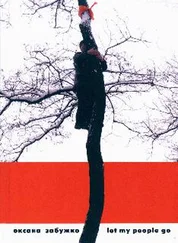

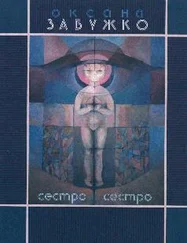
![Оксана Забужко - Тут могла б бути ваша реклама [збірник]](/books/29264/oksana-zabuzhko-tut-mogla-b-buti-vasha-reklama-zbІr-thumb.webp)
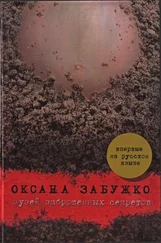
![Оксана Забужко - З мапи книг і людей [Збірка есеїстики]](/books/203319/oksana-zabuzhko-z-mapi-knig-І-lyudej-zbІrka-eseЇsti-thumb.webp)

